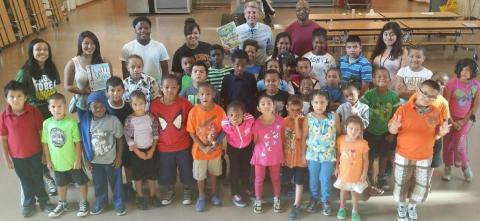
Ending Education Inequality

Throughout his 12-year tenure as Mayor of Minneapolis, R.T. Rybak was always an outspoken advocate for city schools and public education. So it was no surprise that after leaving office in 2013 he took on the role of executive director of Generation Next, a coalition of education, business and civic leaders working to close the achievement gap.
These days Rybak is CEO/president of the Minneapolis Foundation, which in 2015 distributed more than $80 million in grants to the community. But addressing the achievement gap, which he and others believe is more accurately called an equity gap, remains a top priority.
In addition to increasing the Foundation’s commitment to eradicating the equity gap, Rybak continues to work with Generation Next as a member of the group’s executive committee. And he cites the Robert J. Jones Urban Research and Outreach-Engagement Center (UROC) as one of the key partners that has collaborated with the coalition.
“Generation Next went to UROC with questions about the root causes of the achievement gap, which we were calling it then, and they came back after listening to what the community had to say with a very different framework,” he recalls. “After talking with people in the community, they reframed the question through the community’s lens and focused on assets rather than gaps.” That change in perspective helped make broader thinking on the issue possible, and shifted the terminology from achievement gap to equity gap.
“UROC helped us pivot away from trying to fit kids who are not succeeding into a system that is actually failing a broad swath of kids of color,” he explains. “We realized we needed to change the system, to make it more about harvesting assets for all of us rather than focusing on individual gaps.”
To do that means moving away from the current strategy of fitting kids of color into existing systems that has proven to better serve white students. Instead, Rybak says, we must rethink classrooms so that all children learn from each other, increasing everyone’s cultural fluency. “My time on the ground on this issue has really taught me that the system from the classroom on up needs to be dramatically rethought to produce students who can compete in a much more diverse world.”
Ideally, Rybak believes, classroom and school culture needs to be structured to recognize that kids who get a multi-cultural school experience have a head start on kids going to school when one dominant culture masks the assets of other kids. “We white people have an opportunity gap because we aren’t put in enough situations where we learn to cross boundaries,” he says. “Everybody has gaps, and we need to stop looking at kids of color as problems to be solved instead of assets to be cherished. We all need to go to a new place where we all have to navigate differently and address each other’s opportunity gaps.”
Some tactical strategies are already showing great promise, Rybak says, particularly a program called On Track. A Generation Next partnership with Minneapolis public schools, the program provides literacy and math support to struggling students in multi-cultural settings with the goal of keeping them on track toward graduation. Work with UROC is also ongoing. “UROC has become common ground for many discussions about this and other topics,” he says. “It’s a place where people look when they want somewhere to come together to come up with big ideas to help the community.”